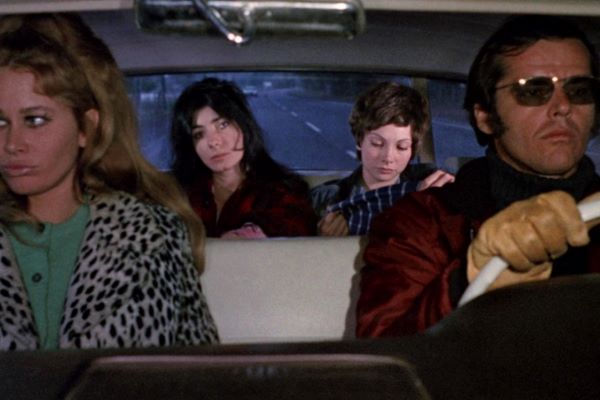Few figures are more closely connected with the birth of the 1970s New Wave of American cinema than Jack Nicholson. His collaborative efforts and relationships with Bob Rafelson, and Raybert Productions cemented a major part of the revolution of ’70s Hollywood. Five Easy Pieces is, in many ways, a landmark not only in his career, but in the annals of Hollywood history. Although Easy Rider would go on to become the film most lauded from that collective, Five Easy Pieces is arguably the more fascinating and insightful film.
Nicholson plays oilfield worker Bobby. He’s a seemingly normal blue-collar guy who spends his days working, drinking, and gambling. When at home, he’s being alternately condescending and passive aggressive towards his live in girlfriend, Rayette (Karen Black). But as the story unfolds it becomes increasingly clear there’s a lot more to Bobby, and there’s history behind his, ‘better than everyone else,’ attitude. While Rayette is a pretty but vacuous diner waitress, Bobby is borderline American royalty. He’s been born into wealth and privilege, from a family of career musicians; only to have fled that lifestyle, and never been able to find his real place in life. It’s only when work goes south, and he receives some bad news from home, that he packs up his car and drives Rayette to his childhood home.
What Five Easy Pieces manages to do so well is show a slice of contemporary life that is both shocking and utterly familiar. Bobby’s lifestyle is a rich man’s dream of ‘living it rough’. But as much as he has tried to escape his past, there are eerie parallels between his discomfort in both worlds. The friends he makes are not wholly unlike his rich kin, and their adherence to simple pursuits of TV and bowling seems to grate on him almost as much as the deep philosophical discussions of his family’s wealthy friends. But while the story is firmly pointing the finger at Bobby, he’s also the only one in it who seems to be genuinely awake. The single exception being his brother’s fiancée, Catherine (Susan Anspach), by whom he can’t help but be entranced.
It’s fair to say that fifty years on from the release of this film, the world has changed rather a lot. While the film’s ‘slice of life’ authenticity, and it’s uncompromising depiction of American society remain undiminished, the novelty of it must necessarily seem lessened. Although despite some awkward moments of pacing, the latter half is untarnished brilliance and a fine reminder of Nicholson’s incredible range. It’s a film that is sadly often overlooked, despite the unarguable importance of its impact, and legacy.
Available on Blu-ay from Mon 16 Nov 2020
